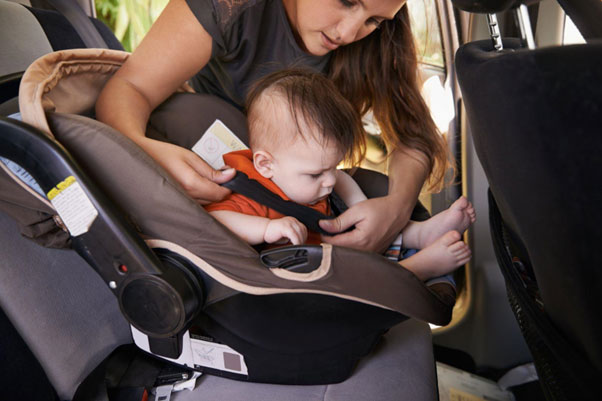As parents, our top priority is always the safety of our children, especially when it comes to traveling in a vehicle. One of the most important tools for ensuring their safety is a car seat. But how long can we confidently rely on these seats to protect our little ones?
Car seats have come a long way in terms of safety and effectiveness, but they also have a limited lifespan. Many parents may not realize that car seats expire and continuing to use them past their recommended lifespan could put their child at risk.
Child passenger safety is a critical concern for all parents, and choosing the right car seat is just the first step. Equally important is understanding how long car seats are good for and when they need to be replaced. In this article, we'll delve into the specifics of car seat expiration and highlight the reasons why it's critical to adhere to these guidelines.
Car Seat Expiration Dates
Car seats have expiration dates for safety reasons. Over time, the materials used in the seat can degrade and weaken, compromising its ability to protect a child in the event of a crash. Exposure to sunlight, heat, and humidity can also contribute to the deterioration of the materials.
Finding the expiration date on a car seat can vary depending on the manufacturer and model. It's typically printed on a sticker or molded into the plastic of the seat itself. Look for a label or stamp that says "Expiration Date," "Do Not Use After," or "Date of Manufacture."
The typical lifespan of a car seat is around 6 to 10 years, but it can vary based on the manufacturer's recommendations. It's important to note that the expiration date refers to the date at which the car seat should no longer be used, regardless of whether or not it's been involved in a crash or sustained any damage.
If you're unsure of when your car seat expires, check the manual or contact the manufacturer. It's always better to err on the side of caution and replace an expired car seat than to risk the safety of your child.

Factors That Affect Car Seat Lifespan
Several factors can affect the lifespan of a car seat, including:
- Usage frequency: The more a car seat is used, the quicker it will wear out. If you frequently use your car seat for daily commutes or long trips, it may not last as long as a car seat that's only used occasionally.
- Exposure to extreme temperatures: Car seats are sensitive to temperature extremes. Exposure to extreme heat or cold can cause the materials to degrade more quickly, reducing the seat's lifespan.
- Accident history: Even minor accidents can cause structural damage to a car seat that may not be visible to the naked eye. As a result, car seat manufacturers generally recommend that car seats be replaced after any type of accident, even if there is no visible damage.
- Maintenance: Proper care and maintenance can extend the lifespan of a car seat. Follow the manufacturer's instructions for cleaning and storing your car seat, and check the seat regularly for any signs of wear or damage.
It's important to keep these factors in mind when determining when to replace your car seat. Even if your car seat hasn't reached its expiration date, if it's been involved in an accident or shows signs of wear or damage, it's time to replace it. The safety of your child should always be the top priority.
When To Replace A Car Seat
There are several instances when it's important to replace a car seat, including:
- The expiration date has passed: All car seats have an expiration date, typically 6 to 10 years after manufacture. After this date, the car seat may not be able to provide the same level of protection as it did when it was new, so it's important to replace it.
- Involved in a moderate or severe accident: If your car seat was involved in a moderate or severe accident, it's important to replace it, even if there is no visible damage. The forces involved in a crash can cause structural damage to the car seat that may not be visible to the naked eye, and this can compromise its ability to protect your child.
- Broken or damaged components: If any part of the car seat is broken, missing, or damaged, it's time to replace the seat. This includes everything from the straps and buckles to the frame and base.
- Recalls or safety alerts: If your car seat has been recalled or there is a safety alert issued for it, follow the manufacturer's instructions for replacement or repair. You can check for recalls or safety alerts by contacting the manufacturer or by checking the National Highway Traffic Safety Administration's website.
Conclusion
Child passenger safety is of the utmost importance and ensuring that your child's car seat is functioning properly and is not expired is crucial. While it may be tempting to use a hand-me-down car seat or to keep using a car seat that has exceeded its expiration date, it is not worth the risk to your child's safety.
By following the guidelines set forth by the car seat manufacturer and the National Highway Traffic Safety Administration, you can ensure that your child is protected while riding in a vehicle. Remember, car seats may have an expiration date, but your child's safety does not.

Frequently Asked Questions:
Can I Use A Secondhand Car Seat?
It is not recommended to use a secondhand car seat, as car seats have an expiration date and may have been in an accident, compromising car seat safety. It's essential to invest in a new car seat to ensure your child's safety while traveling.
Can I Continue To Use A Car Seat If The Car Seat Expiration Date Has Passed But It Has Not Been Involved In An Accident?
While it may be tempting to continue using a car seat past its expiration date, it is not recommended. A car seat's expiration date is usually based on guidelines from the manufacturer and is designed to ensure that the car seat is safe and effective. Over time, the materials used to make the car seat can degrade, making it less effective in protecting your child in the event of an accident.
Even if the car seat has not been involved in an accident, it is still important to follow the manufacturer's guidelines and replace it once it has passed its expiration date. The safety of your child should always be your top priority.
How Do I Properly Dispose Of An Expired Car Seat?
To properly dispose of expired car seats, you should not donate, resell, or give them away to others. Instead, dismantle the car seat and discard it in a way that prevents it from being used by others. You can contact your local waste management facility to see if they have a program for car seat recycling or if they can dispose of it properly.
Can I Recycle A Car Seat?
While car seats can technically be recycled, it is not recommended due to safety concerns. Car seats expire and have certain guidelines for when they should no longer be used, and recycling them may compromise their structure and safety. It is generally advised to dispose of expired car seats instead of attempting to recycle them.


